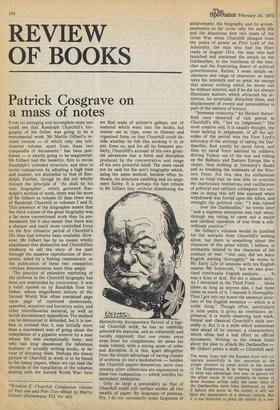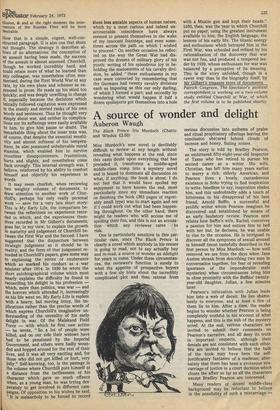Patrick Cosgrave on a mass of notes
From its emerging and incomplete state one could see that Randolph Churchill's biography of his father was going to be a monumental work. Mr Martin Gilbert's revised version — of which only one substantive volume, apart from these two compendia of documents,* has been published — is clearly going to be magisterial. Mr Gilbert had the temerity, first to revise Randolph's intended structure, and then to Invite comparison by adopting a high tone and manner, not dissimilar to that of Randolph. Further, though he did not wholly discard the principle of He shall be his own biographer ', which governed Randolph's method of work, there was far more of Mr Gilbert in volume III than there was of Randolph Churchill in volumes I and H. This presence of the biographer meant that the third volume of the great biography was a far more conventional work than its predecessors; but it also meant that there was a sharper and much more controlled focus on the first climactic period of Churchill's life than had hitherto been available. However, Mr Gilbert has by no means wholly abandoned that distinctive and Churchillian tendency to tell the story of the past through the massive reproduction of documents, aided by a linking commentary, as the publication of these two companion volumes demonstrates more than amply.
The practice of extensive reprinting of the archives in the Churchill biography has been not unattended by controversy. It was a habit carried on by Randolph from his father, whose magnificent history of the Second World War often contained page upon page of reprinted memoranda, speeches, minatory and hortatory notes, and other miscellaneous material; as well as lavish documentary appendices. The method can be denounced or defended, but it is useless to pretend that it was initially more than a convenient way of going about the compilation of a gigantic memoir by a man whose life was exceptionally busy, and who had long abandoned the laborious business of actually writing books, in íayour of dictating them. Perhaps the truest picture of Churchill at work is to be found, In the Ismay papers, where we can read the chronicle of the compilation of the volumes dealing with the Second World War: here we find wads of printer's galleys, not of material which went into the books, but matter set in type, even in literate and organised form, so that Churchill could decide whether he felt like sticking it in or not. Even so, and for all its frequent prolixity, Churchill's account of his own greatest adventure has a force and discipline produced by the concentration and range of his own powerful mind. The same could not be said for his son's biography which, using the same method, became often inchoate, its structure rambling and its argument flabby. It is perhaps the best tribute to Mr Gilbert that ,without abandoning the distinctively documentary flavour of a typical Churchill work, he has so carefully selected his material, and so coherently and lucidly organised, that one comes away even from his compilations, let alone his main volume, with a strong sense of order and discipline. It is this, apart altogether from the simple advantage of having chunks of archives on one's bookshelves — besides the Churchill papers themselves, more than seventy other collections are represented in these two companions — which justifies his secondary enterprise.
Only so large a personality as that of Churchill could still surface amidst all this wealth of paper. By largeness of personality, I do not necessarily mean largeness of achievement: the biography and its accompaniments so far cover only the early life and the disastrous first two years of the Great War when Churchill plunged from the peaks of power as First Lord of the Admiralty, the man who had the Fleet ready in August 1914, the man who had launched and sustained the attack on the Dardanelles, to the loneliness of the trenches and the frustrating desert of political powerlessness. Rather, I mean simple exuberance and range of character: so many were his interests and so great his energy that almost nothing which he wrote can be without interest, and if he did not always illuminate matters which attracted his attention, he invariably disturbed them, and displacement of events and personalities is part of the essence of history.
"Immense creativity," Sir Herbert Butterfield once observed of this period in Churchill's life, "but no judgement." The most creative and, it is usually thought, the most lacking in judgement, of all the episodes of the period was the First Lord's advocacy of the strategy of taking the Dardanelles, first purely by naval force, and then by naval force assisted by soldiers, driving Turkey out of the war and rolling up the Balkans and Eastern Europe like a carpet, thus striking at Germany's flanks and so breaking the stalemate of the Western Front. For this idea his enthusiasm was so total that he was able to override the inarticulate hesitations and vacillations of political and military colleagues: his success in doing this left him exposed when withdrawal was forced upon the Allies, and wrought his political ruin. "I was ruined . . . over the Dardanelles," he wrote later "and a supreme enterprise was cast away, through my trying to carry out a major and cardinal operation of war from a subordinate position."
Mr Gilbert's volumes would be justified for the extracts from Churchill's writing alone, but there is something about the character of the prose which, I believe, is intimately related to the character of his conduct of war. " Not only did we learn English parsing thoroughly," he wrote in My Early Life of sessions with his English master, Mr Somervell, "but we also practised continually English analysis. . . . It was a kind of drill. We did it almost daily. As I remained in the Third Form . . . three times as long as anyone else, I had three times as much of it. I learned it thoroughly. Thus I got into my bones the essential structure of the English sentence — which is a noble thing." Though often, particularly in later years, it gives an overblown impression: it is worth observing how stark, fOt-Mal and classical Churchill's style normally is. But it is a style which sometimes runs ahead of its context, a characteristic which often had a bad effect on official documents. Writing to the Grand Duke about the plan to attack the Dardanelles — Mr Gilbert prints a draft — Churchill said:
The Army hope that the Russian Govt will cooperate powerfully in this operation at the proper moment by naval action at the mouth of the Bosphorous, & by having troops ready to seize any advantage that may be gained for the allied cause. It wd probably be better to deter Russian action until the outer forts of the Dardanelles have been destroyed, so that if failure shd occur at the outset, it will not have the appearance of a serious reverse. But it is our intention to press the matter to a con
elusion, & and at the right moment the intervention of the Russian Fleet will be most desirable.
Now that is a simple, cogent, well-constructed paragraph. It is also one that shuts out thought. The strategy it describes allows of no alternatives: the conception of an assault having been made, the success Of the assault is almost assumed. Churchill, though he worked incredibly hard, and could retain more of what he learned than any colleague, was nonetheless often mesmerised, during the First World War at any rate, by his own plans and schemes as exPressed in prose. He made up his mind too quickly; and was deeply unwilling to change It, especially because the decisions which Initially followed cogitation were expressed in the stately and serried ranks of his own Words and sentences. Thus he thought very simply about war, and neither its complications nor its sufferings were easily available to him, to give him pause or doubt. The remarkable thing about the inner man was, of course, that despite the essential sensitivity and almost softness of his temperament, he also possessed unbelievable moral stamina, which enabled him to survive countless disappointments, frustrations, hurts and slights, and nonetheless come back strongly. This internal strength was, I believe, reinforced by his ability to comfort himself and objectify his experience in Words.
It may seem churlish, when reviewing two weighty volumes of documents, to draw attention to another work of Churchill's, perhaps his only really personal Work — save for a very late short story: This is My Early Life, the comparison between the reflections on experience recorded in which, and the experiences them(lives recorded in Mr Gilbert's documents, goes far, in my view, to explain the growth in maturity and judgement of Churchill between the First War and the Second. I have suggested that the disjuncture between strategic judgement as it should be in reality, and the form of that judgement recorded in Churchill's papers, goes some way to explaining the errors of exuberance Which so marked his conduct as a war Minister after 1914. In 1930 he wrote the Short autobiographical volume which most nearly explains the difficulty he found in reconciling his delight in his profession — Which, more than politics, was war — and the horrors which attended it, increasingly as his life went on. My Early Life is.replete With a heavy, but moving irony, the implications rather than the precise words of Which express Churchill's imaginative understanding of the unreality of his early delight in war. Of the Malakand Field Force — with which he first saw action — he wrote, "So a lot of people were killed, and on our side their widows have had to be pensioned by the Imperial Government, and others were badly wounded and hopped around for the rest of their lives, and it was all very exciting and, for those who did not get killed or hurt, very bony." Self-knowing, too, is the passage in the volume where Churchill puts Nmself at a distance from the tactlessness of his Character , which gave so much offence When, as a young man, he was trying desPerately to get involved in different campaigns. Of opposition to his wishes he said, "It is melancholy to be forced to record these less amiable aspects of human nature, which by a most curious and indeed unaccountable coincidence have always seemed to present themselves in the wake of my innocent footsteps, and even sometimes across the path on which I wished to proceed." On another occasion he reflected on the way the Great War had disproved the dreams of military glory of his youth: writing of his splendrous joy in beholding the manoeuvres of his cavalry division, he added "these enthusiasms in my case were corrected by remembering that the Germans had twenty cavalry divisions each as imposing as this our only darling, of which I formed a part; and secondly by wondering what would happen if half a dozen spoilsports got themselves into a hole with a Maxim gun and kept their heads." 1930, then, was the year in which Churchill put on paper, using the greatest instrument available to him, the English language, the lessons of his early life. The titanic energy and enthusiasm which betrayed him in the First War, was schooled and refined by his rationalisation of the discovery that war was not fun, and produced a tempered leader by 1939, whose enthusiasm for war was balanced by a perception of its meaning. This is the story unfolded, though in a rawer way than in the biography itself, by Mr Gilbert's treasure store of documents. Patrick Cos grave, The Spectator's political correspondent, is working on a two-volume study entitled Churchill at War, of which the first volume is to be published shortly.



































 Previous page
Previous page